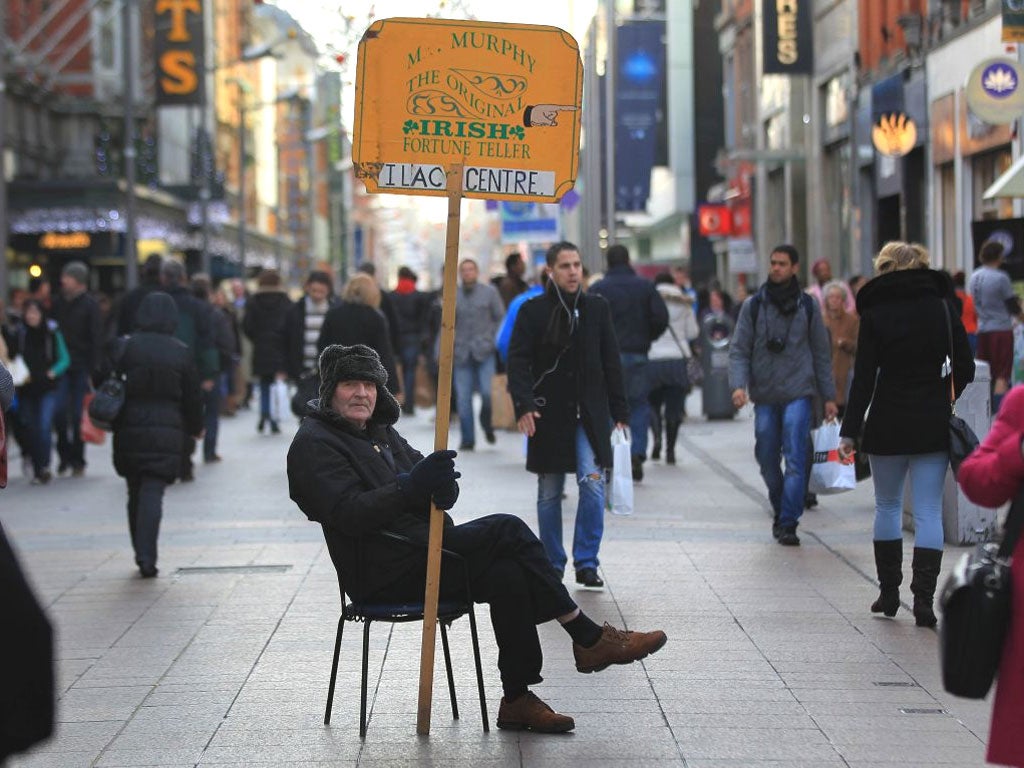Adrian Hamilton: Is there really no alternative? Let Irish voters be the judge of that
World View: Solutions are being pushed on the basis of 'no alternative'. Yet there are alternatives

The saddest comment to come from Europe this week was made by a senior Brussels official who declared that the eurozone crisis was now on its way to a solution thanks to the intervention of the European Central Bank to pump a further half-trillion euros into the system by way of loans to the banks.
Oh, yes? With the Irish now holding a referendum on the new fiscal pact agreed by eurozone members, with the Bundesbank openly criticising the ECB for its actions, and the markets stolidly refusing to believe in the Greek bailout or in the guarantees on sovereign debt, does anyone really believe it's over? Certainly not in the capitals of Europe, Berlin and Paris among them.
That's the trouble with the EU at the moment. It has become a case of the dog that doesn't bark. The only thing at all interesting about its summits is not what they decide but that they never quite decide anything.
Look at the latest summit in Brussels, which began yesterday and should finish today. It was supposed to set the seal on the new fiscal pact that would create a new era of fiscal responsibility and economic union. It was also intended to raise the ceiling on the bail-out funds to a level that would convince the markets that the eurozone was here to stay, solid, complete and effective.
Instead the decision on the size of the bailout fund has been pushed to later in the month (or the month after or the month after that, as the case may be). There was also meant to be a separate summit of eurozone leaders today to propel the whole thing forward. That will not now happen. "It wasn't cancelled because it was never officially on the agenda," said a spokesman in that glorious Brussels double-speak.
The Irish court ruling that the country would have to hold a referendum certainly doesn't help. At the minimum, it will delay the process by several months, at least in terms of final completion (the pact can go ahead without Ireland). It also stands the chance of arousing all the public doubts and antagonism towards the whole way European leaders have pursued austerity as the be-all and end-all of economic policy.
But then that is democracy. The referendum in Ireland will succeed, argued Dick Roche, the former Irish minister for European affairs, on the BBC this week, because it was different from the troublesome Treaty of Lisbon. Then, the establishment was trying to sell something complex and abstract. This time, the public understood it was a matter of "survival".
That is just the problem. Solutions, and a new pact, are being pushed on the citizenry by their leaders on the basis of "no alternative". Yet there are alternatives. They include letting Greece default, changing the ECB rules to allow it to be the lender of last resort, issuing eurobonds, allowing the new European Stability Mechanism to run in tandem with the current European Financial Stability Facility instead of replacing it, and producing a co-ordinated Europe-wide reflation programme.
One understands the problems. The Germans don't want it. The French want the Germans to take all the pain. The British just want to stand on the sidelines. So we have the current proposals of a half-baked pact that lacks the teeth to convince the markets it means much but nonetheless threatens to make an undemocratic system even more undemocratic by taking away nations' rights to control their own budgets. It is a curious irony that, while Wales and Scotland here see greater independence through control of their own taxes, Europe is moving in the opposite direction and trying to remove it.
The ECB has bought Europe time but the time should be used to think through the fundamentals, not just hold summits for the sake of holding summits, as its leaders are doing now.
The Saudis flex their muscles
The Saudi Arabian Foreign minister wasn't joking when he cut across William Hague, the Foreign Secretary, at the recent London summit on Sudan, to say that his country had no objections to arming the Syrian rebels. Indeed, it doesn't. It's already doing it through Iraq and, with Qatar, has a positive policy towards regime change. It is an ironic reality of the Arab Spring that the most active interveners are now the Saudis and Qataris, both of whom represent the sort of family autocracies the Arab street is rising against.
The danger to the region and the world is in Saudi motives. The more the kingdom feels threatened by the Arab Spring, the more it has clamped down at home and used its muscle abroad. And it does this with a clear religious bent, to promote the Sunni cause against the Shia Alouite regime in Syria, the Shia government in Iraq, its own Shia minority at home and the non-Arab, Shia Iran .
The region doesn't need this from Saudi Arabia, not with the upheaval already under way. London and Washington know this full well, but prefer to ignore it.
Join our commenting forum
Join thought-provoking conversations, follow other Independent readers and see their replies
Comments
Bookmark popover
Removed from bookmarks